The Medium on Xbox Series X
“So there I was, existing in two worlds, but not really living in either.”
Marianne comes out with this line about midway through The Medium, and it’s a quote that near-perfectly sums up how I feel about the game’s unique dual-reality mechanic: while its inventiveness is admirable, the design never feels as though it realizes its true potential and pushes Blooper Team’s latest horror to truly mind-altering heights.
That being said, there’s no doubt that The Medium is still the developer’s most ambient and cinematic game to date, which is saying something indeed given that the Layers of Fear series and Observer are hugely impressive in that same regard.
The Medium’s story focuses around Marianne, a young woman who possesses the ability to see and explore the spirit world — a dark reflection of our own reality where the things we repress can take on a form entirely of their own. Haunted by the vision of a child’s murder, and driven by a burning desire for answers, Marianne heads to the Niwa Hotel to meet a strange man who contacts her, promising the closure she so desperately seeks. Yet, when she arrives there, she finds herself completely alone… at least in the material world.
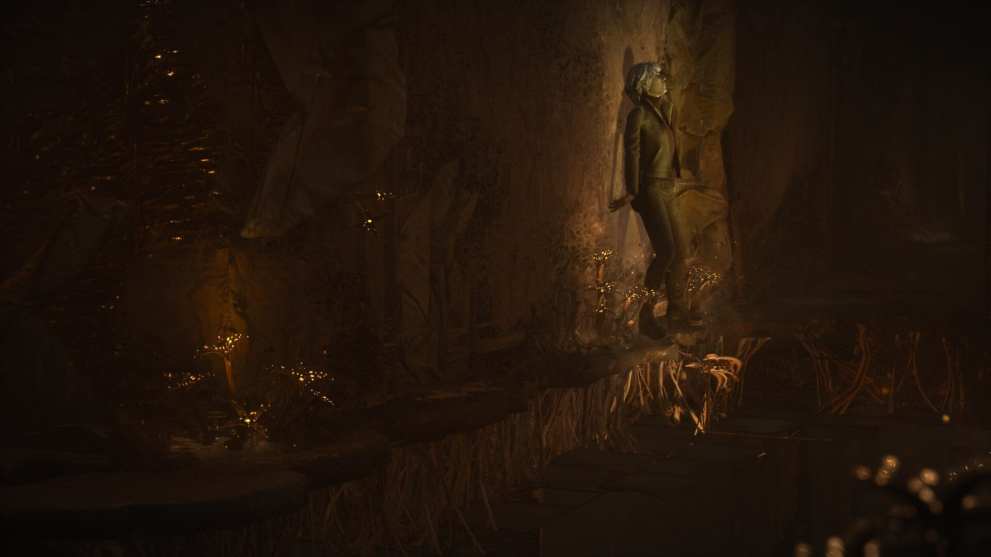
From then on, the narrative sees Marianne exploring the Niwa hotel, encountering spirits and other supernatural phenomena that both help and stifle her progress. For the most part, the game maintains a solid pacing and a good balance between interesting gameplay and narrative tidbits.
However, there were a few times towards the middle to later stages of the game where that balance is lost somewhat. You’ll find yourself doing a lot of walking around, learning more about the story for significant periods of time, while the more interesting dual-reality exploration and puzzle segments take a backseat.
Fortunately, The Medium’s story had me hooked from the get-go to forgive these slower sections, and the further you get into the story, the more intriguing it becomes.
It’s a tale that touches on themes of betrayal and deception, with a supernatural take on how our darkest moments can manifest within our personalities. How events from our childhood can ultimately determine how we choose to use our talents. How they can unknowingly shape us into the people we choose to become. And how these events can damage a person’s psyche and mental wellbeing, often blinding them from the reality of their words and actions, until it’s too late.
Through its varied cast of characters, it’s a reminder not to take anything or anyone at face value. Sadness, the incredibly creepy-looking girl, becomes this bastion of childlike innocence and a friend of Marianne, albeit a mischievous one.
It’s a story in which those in positions of responsibility and trust are found to have done the cruelest of things. Despite Marianne’s best efforts, she cannot save someone simply because she wants to. Sometimes people can’t be saved, at least not without some unwanted consequences.
The more questions it raises, and the more the interconnected-ness of it all slowly starts to come together.
In that regard, these slower sections were often quite welcome, giving you a chance to piece together a little more of the mystery. Not to mention a welcome respite from the intense sections where The Maw — the mysterious antagonist — is hunting you down. Were it not for the compelling narrative, these more straightforward sections might hinder the experience more than they do.
While I won’t say too much more on particular plot points, I will note that it can get a little messy in parts. Thankfully, this is all explained and resolved by the game’s end — which was particularly profound — and having had time to digest the story in its entirety, I’d snap up any opportunity to return to the Niwa complex or Marianne’s world (…worlds?) in a sequel.
Overall, Bloober Team has done a fantastic job of character and world-building. Marianne is a likable character, providing occasional, off-the-cuff commentary that helps build her personality and makes her plight all the more relatable. The Maw is also quite possibly the creepiest, most unsettling antagonist I’ve encountered in a good few years.
Troy Baker’s performance makes the antagonist befitting of the setting. From deep and bellowing tones, through to creepily high pitches, The Maw just oozes with the same unsettling nature that the Niwa Complex exudes.
You quite literally dread the next moment it appears, taunting you with lines of horrifying imagery as it stalks you through abandoned hallways, or through the soul-strewn lands of the spirit world, inspired by the works of Polish surrealist painter Zdzisław Beksiński.
This inspiration is prominent throughout the spirit world, with deformed figures decorating walls, landscapes almost actively decaying where they stand. It helps create a depressingly surreal mirror of the real-world. One that adds to the dark and foreboding atmosphere of Niwa itself, fueled by the events, actions, and thoughts that manifested within its walls.
Niwa itself is a hauntingly beautiful place with an equally unsettling backstory. It was a gated holiday resort that suddenly went dark, with rumors of crazed workers and a massacre taking place there. It’s a fascinating and simultaneously fear-inducing place to explore.
The place is dripping with atmosphere from the moment you walk up to the complex’s gated entrance, an abandoned wreck of its former self. Throughout, blood splatters the walls, Memory Shards uncover the dark things that went on inside its walls, and childrens’ toys litter the floor, providing a juxtaposition of emotions and atmosphere with their dingy, haunting surroundings.
It’s not just a single, spooky path you follow, either. The Medium often throws up branching paths, or a little random offshoot that I just felt like I needed to explore in the hope that Marianne would chirp up, or I’d find an Echo, Memory Shard, or another collectible that would provide further context to the various characters of Niwa’s past.
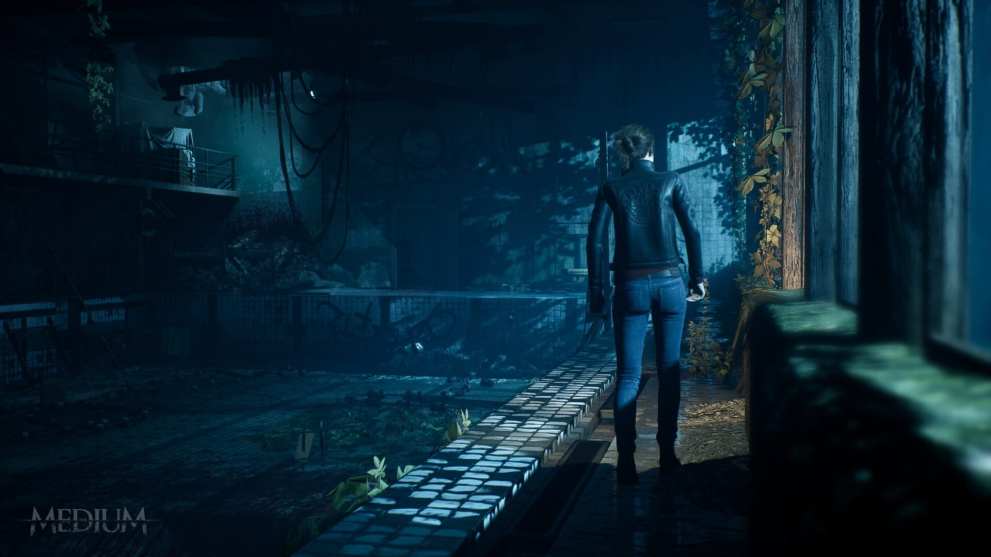
And here’s where The Medium stands out from the rest of the horror genre — its dual-reality gameplay. Throughout your time in the Niwa complex, Marianne will encounter ‘The Split’ — the game’s name for when Marianne finds herself straddling both the material and spirit worlds. It’s not something she can control.
If a place has a story to tell, Marianne is there to listen, as she so aptly puts it towards the beginning of her trip to Niwa. It adds to the atmosphere and suspense whenever a ‘split’ occurs. You have no idea what is about to come your way, but something is.
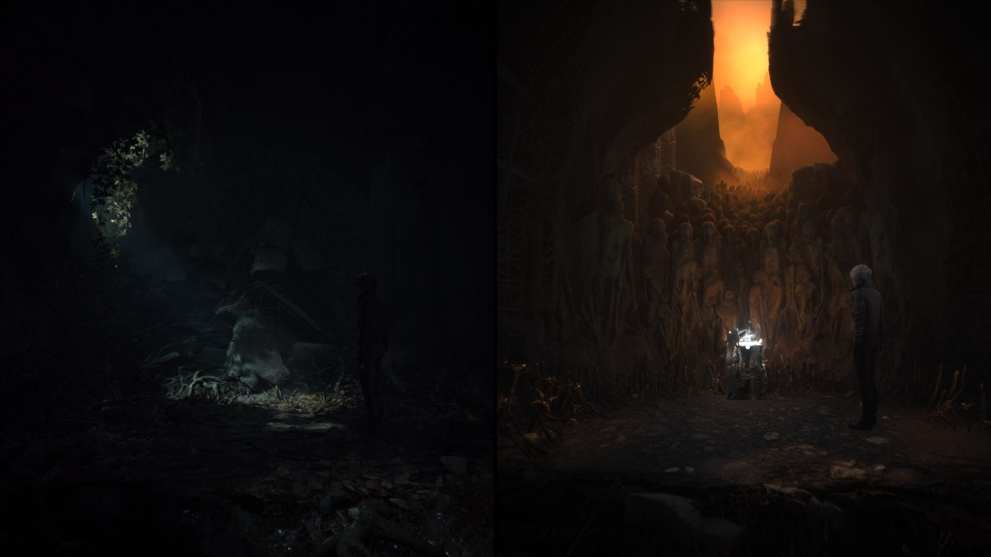
Exploring both the material and spirit worlds simultaneously is done in a way that feels so natural. It never feels cumbersome to control, as you explore one world in search of an item, or to interact with a particular object before advancing in the other. The absorbed energy from the spirit world being used to power a switchboard in the real world, for example.
The puzzles aren’t overly obtuse, and having Marianne’s ‘Insight’ ability (tied to the LB button) which highlights objects of interest in your surroundings, means you’ve always got a clue at your disposal if you’re really struggling, without giving away exactly what you need to do.
My only big complaint regarding the dual-reality segments of The Medium is that I often felt Bloober Team didn’t go far enough with it. The gameplay can often be distilled down to little more than exploring one world to find a switch or item, to then bring back to the other world to unblock a path or find a way around an obstacle.
In the moments when it goes beyond this and has you flipping between the two worlds frequently, is when the gameplay — and the game as a whole — truly shines. Fortunately, it’s a novel enough mechanic to make what would ordinarily be more mundane gameplay sections tied to just one reality more interesting, but I was left feeling as though there was some untapped potential here that I’d love to see realized in any potential sequel Bloober Team may be conjuring up.
But when you do venture into the spirit world, it truly is a toe-curling experience. One that, with the screams of broken souls and the stretching fingers of undead hands, will haunt you long after you’ve returned to the material world. It makes Niwa feel warm and welcoming in comparison.
This is thanks in no small part to just how stunning The Medium looks on Xbox Series X. The Medium is the kind of cinematic, AA experience that feels right at home on Game Pass. It features ray-tracing technology on compatible PC rigs and the Series X|S and is a great showcase of what Microsoft’s new hardware is capable of in terms of not only visuals but gameplay advancements (such as the dual-reality sections), too.
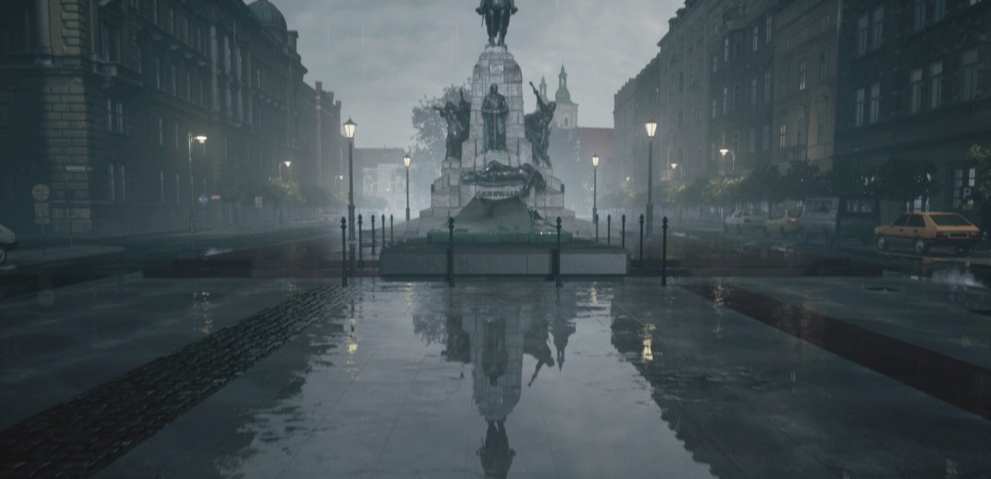
Exploring two worlds, both in exquisite detail at the same time, (almost always) without any performance hiccups in the process is something that has me very excited about the future of games. It’s the kind of innovative step I hope more developers take in this relatively new generation of consoles to breathe new life into traditional genres.
While boldly venturing into new territory, The Medium does opt for an old-school horror staple. The game strips away the security of free camera movement, in favor of fixed camera angles throughout, clearly harking back to those iconic third-person horror titles of yesteryear.
While these did take a little bit of getting used to, Bloober Team has managed to utilize these perfectly to lend a bit of artistic and cinematic flair to Marianne’s story. Each fixed camera frames the action in such a way that it either looks visually incredible or almost helps to up the atmospheric ante.
Hugging the floor by a tight corner to build suspense, or peering through forest foliage from a top-down perspective as Marianne walks cautiously below, as if watching through the eyes of a predator, just waiting for the right moment to strike. It gives actions as simple as navigating the world such an atmosphere and intensity that would be lost if you were free to move the camera angle as you wish.
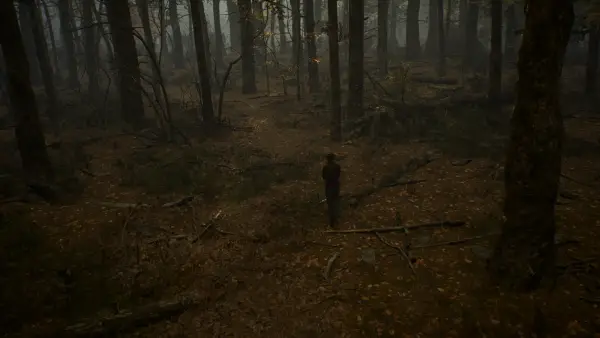
I did find that the game had a few examples of camera stutter and a few random graphical glitches, but these were pretty rare and didn’t detract from the otherwise exceptional presentation values on display.
Having played titles like Miles Morales, God of War, and The Last of Us: Part II on PlayStation, Xbox’s exclusive have for so long — for the most part — felt behind the curve. The Medium doesn’t. It’s the kind of game that the Xbox Series X needed at launch. It’s got me optimistic not only about the future of Bloober Team but about Xbox exclusives on the whole. If this is a sign of things to come for Xbox in 2021, it’s looking to be a great year ahead.
That being said, The Medium isn’t perfect. Bloober Team’s most ambitious ideas aren’t realized to their full potential, but it’s a step in an exciting new direction. The pacing stumbles in the middle, but that’s where the enticing narrative picks up the slack to drive you through. The dual-reality mechanic goes just about far enough to keep its slowest gameplay moments interesting, and paired with a fantastic narrative and exceptionally eerie atmosphere, it’s an easy recommendation for fans of Bloober Team’s work in the past and the horror genre in general.
- Compelling narrative keeps you hooked throughout.
- Excellent visuals that showcase the Series X|S's capabilities.
- Dual-reality gameplay is excellent, even adding to narrative cutscenes.
- Niwa and the spirit world are atmospheric, unsettling places to explore.
- Pacing falls off a little in the middle.
- Fixed camera angles can take some getting used to.
- Dual-reality puzzles could have been pushed further.

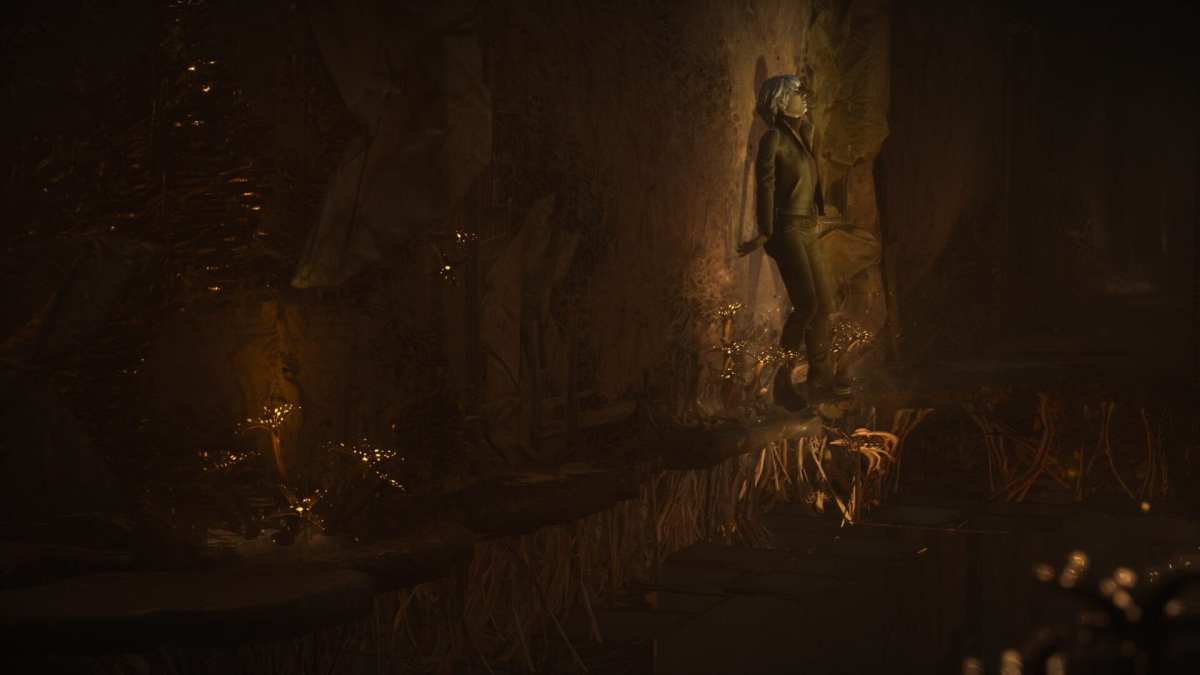








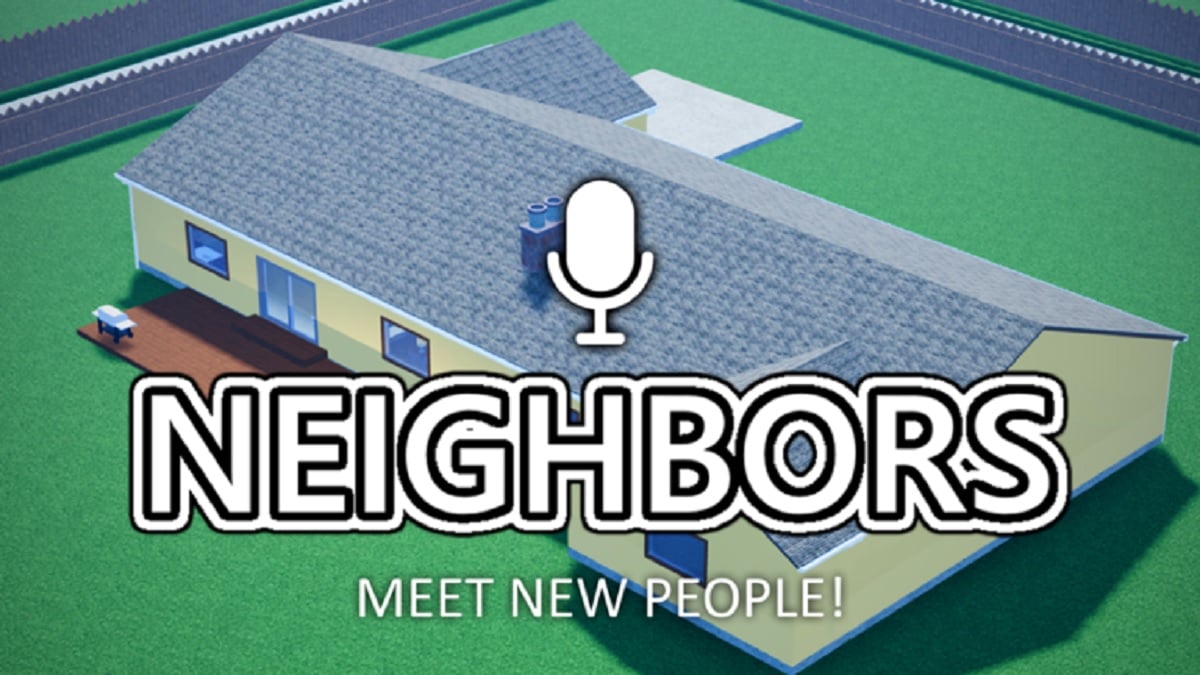


Updated: Apr 2, 2021 02:34 pm